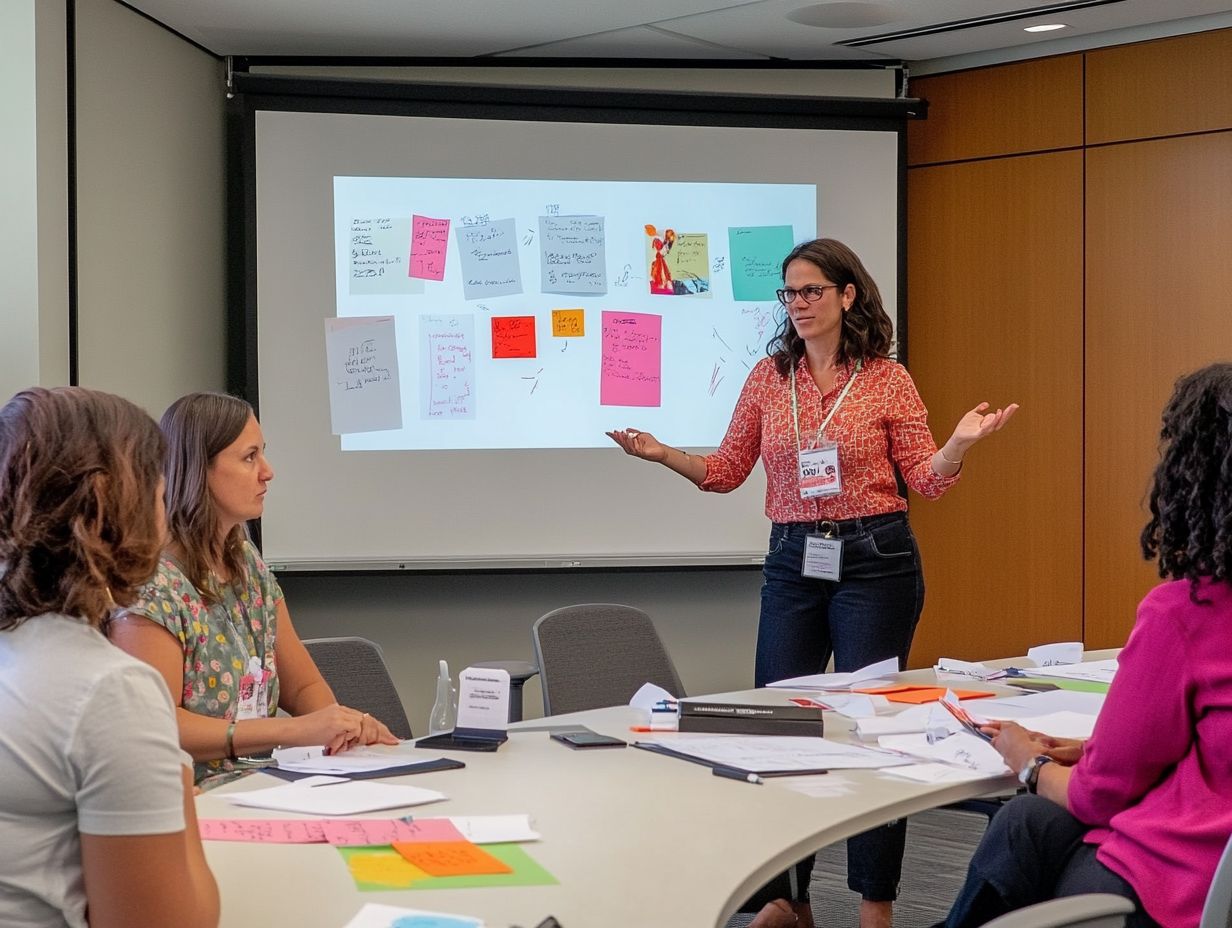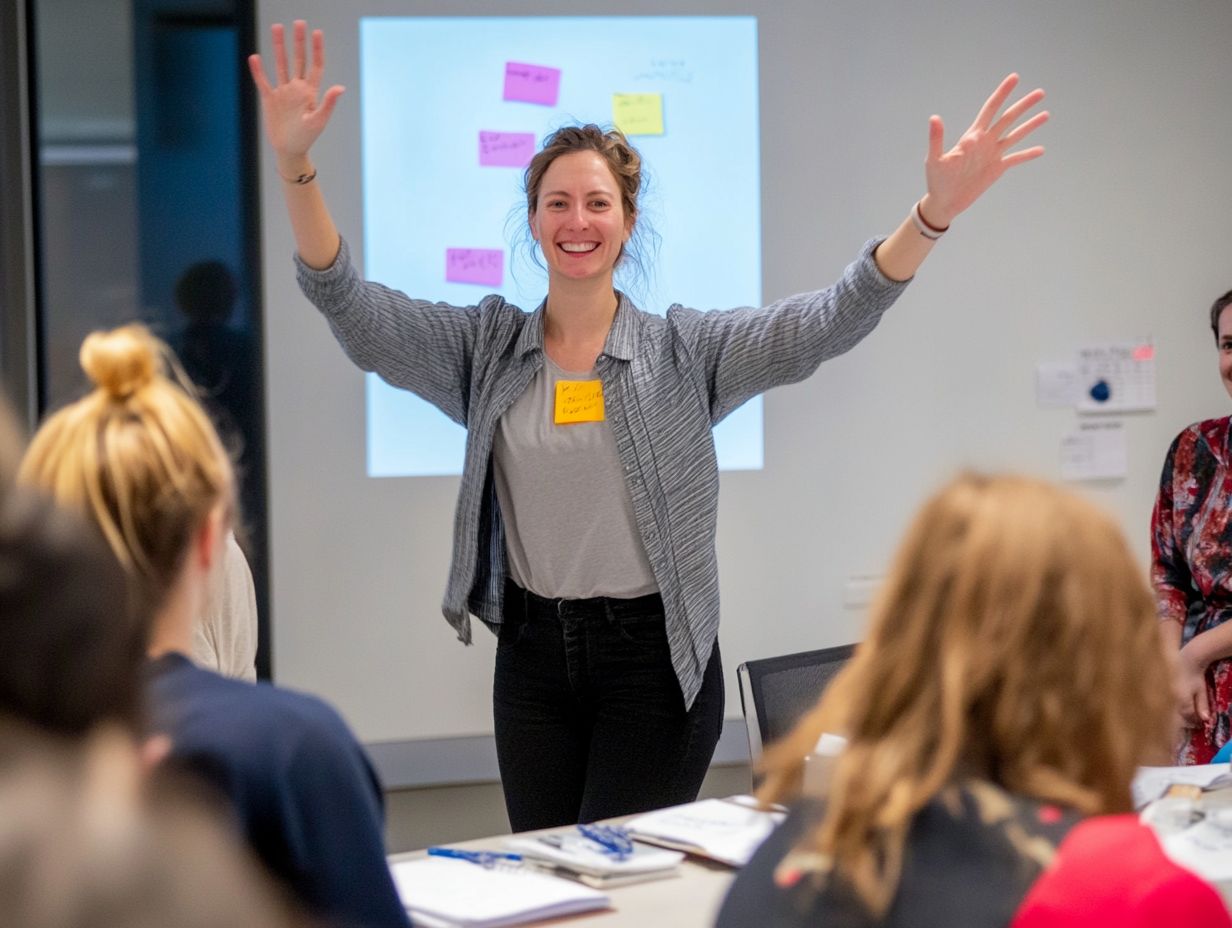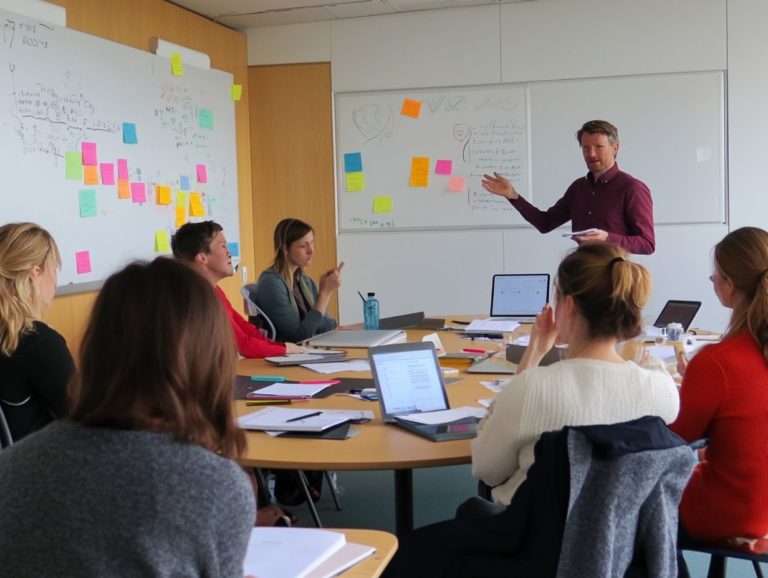What Are the Key Roles of an Effective Trainer?
In today s fast-paced world, the role of an effective trainer is more vital than ever. You re not just there to share knowledge; you need to inspire and engage your learners, captivating their attention and fostering a genuine thirst for understanding.
This piece delves into the essential skills and qualities that elevate a trainer to true impact think communication prowess, adaptability, and deep subject matter expertise.
It highlights effective training techniques, the challenges you may encounter along the way, and underscores the importance of ongoing education. Join in as you discover what it truly takes to become a standout trainer.
Contents
Key Takeaways:

- Adaptability and strong communication skills are essential for an effective trainer to connect with and engage their trainees.
- A successful trainer must possess subject matter expertise, empathy, and patience to effectively teach and support their trainees.
- Engaging training techniques that cater to individual needs are key to a successful learning environment.
The Importance of an Effective Trainer
An effective trainer holds a crucial position in ensuring that training programs not only meet organizational needs but also align seamlessly with business objectives.
When training programs align with business objectives, they become more effective, enhancing training effectiveness and boosting learner engagement.
A skilled trainer employs a variety of teaching methodologies specifically designed for adult learners. They emphasize active learning strategies that promote skill development and elevate the overall training experience.
Use instructional design principles to create training materials that truly resonate and make a difference! This enriches participants’ journey of learning throughout life.
Understanding the Role of a Trainer
The role of a trainer involves not just designing but also delivering effective training that specifically addresses your needs while aligning with established training goals.
Beyond crafting engaging curricula, trainers are responsible for conducting thorough needs analyses to fully understand the unique requirements of their audiences. This means assessing knowledge gaps.
By employing diverse teaching methodologies, trainers can develop tailored instructional design strategies that cater to various learning styles.
Therefore, trainers have many responsibilities that extend far beyond mere content delivery. They require an adaptive approach, ongoing evaluation, and a steadfast commitment to nurturing an inclusive and effective learning environment for everyone involved.
Essential Skills and Qualities of an Effective Trainer
An effective trainer embodies a unique blend of essential skills and qualities that elevate their training delivery while fostering an environment ripe for learning.
Strong communication skills, adaptability to diverse teaching methodologies, and a profound understanding of the subject matter are critical in engaging participants and ensuring overall training success.
Empathy and patience are equally vital, allowing trainers to connect with learners on a personal level, address their unique needs, and cultivate a supportive atmosphere that encourages skill development.
Communication and Adaptability
Effective trainers excel in communication skills and adaptability. These skills enable a genuine connection with participants and tailor training delivery to diverse learning styles.
This ability ensures that the content resonates with each individual and fosters an inclusive environment where learners feel valued and heard.
When you prioritize clear communication, you encourage open dialogue and collaboration, enhancing participant engagement and motivation.
By actively listening and responding to feedback, you can adjust your approaches, reinforcing a learner-centered strategy that promotes understanding and retention.
Ultimately, honing these effective communication skills is crucial for creating a dynamically training atmosphere, giving learners the power to take charge of their own educational journeys!
Subject Matter Expertise

Subject matter expertise is an essential quality for any trainer, as it gives you the power to deliver impactful training and create materials that truly resonate with learners.
When you possess a deep understanding of your subject area, you can adjust your training methods to accommodate various learning styles and preferences. This adaptability not only boosts engagement but also ensures that the content remains relevant and applicable to real-world scenarios.
As a knowledgeable trainer, you can confidently address questions and offer insights that elevate discussions. This fosters a collaborative environment where learners feel valued and motivated. This expertise ultimately improves the whole learning experience, enabling participants to grasp complex concepts more easily and apply them effectively in their respective fields.
Empathy and Patience
Empathy and patience are essential qualities for effective trainers, enabling you to foster learner engagement and create a supportive environment that encourages skill development.
By embracing these attributes, you can gain a deeper understanding of the individual needs and challenges your employees face. This allows you to deliver tailored instruction that resonates on a personal level.
When you show empathy by listening to an employee’s concerns about a complex topic, it paves the way for a more customized training approach. Exhibiting patience during skill acquisition conveys that you value the employee’s growth journey, inspiring confidence and alleviating anxiety.
These actions supercharge the learning experience and cultivate a culture of trust, ultimately leading to improved retention of knowledge and greater overall job satisfaction.
Effective Training Techniques
Effective training techniques are crucial for engaging learners and fostering an environment of active participation, ensuring that you remain both interested and invested in your training experience.
By incorporating a variety of training strategies, you can cater to different learning styles and create personalized approaches that enhance your engagement and understanding.
Leveraging diverse teaching methodologies and instructional design principles will empower you to craft impactful training sessions that precisely address your specific needs.
Engaging and Interactive Methods
Engaging and interactive methods are essential for capturing your interest and ensuring active participation during training sessions, ultimately leading to better knowledge retention.
One highly effective strategy to achieve this is gamification, or adding game-like elements to learning, which makes the process more fun and effective. By incorporating points, badges, and leaderboards, this approach transforms learning into an enjoyable experience while fostering a sense of competition that encourages you to immerse yourself fully.
Microlearning means breaking lessons into bite-sized parts to make them easier to learn. This combination not only enhances your overall training experience but also allows you to engage at your own pace, ultimately promoting deeper understanding and connection with the material.
Individualized Approaches
Implementing individualized approaches in training programs is essential for effectively engaging learners and accommodating their diverse learning styles. By tailoring your training techniques to meet specific needs, you create an environment where every participant feels valued and understood.
This level of customization not only boosts motivation but also maximizes knowledge retention, allowing learners to connect with the content in a way that truly resonates with them.
Such personalized strategies often lead to remarkable improvements in performance, as individuals are more inclined to apply their newly acquired skills effectively. Enhancing overall learner satisfaction through targeted training methodologies generates a ripple effect, positively influencing team dynamics and contributing to your organization s success as a whole.
Start implementing these techniques today for a more engaging training experience!
Challenges Faced by Trainers

Trainers frequently encounter a range of challenges that can impede their ability to effectively address what participants need to learn and sustain participant engagement during sessions.
For example, you may find yourself grappling with diverse learning styles while juggling the logistics of training delivery.
Recognizing these hurdles is crucial, as it allows you to devise strategies that not only overcome obstacles but also enhance overall training outcomes.
Common Obstacles and How to Overcome Them
Common obstacles you might encounter include resistance to change from participants, lack of resources, and challenges in assessing training effectiveness.
These hurdles can significantly hinder your ability to achieve successful training outcomes, ultimately stalling both performance and growth.
Engaging participants early helps reduce resistance. Soliciting their input fosters a sense of ownership and collaboration that transforms their mindset.
When faced with resource limitations, think outside the box. Leveraging technology, like online training platforms, can provide the flexibility and accessibility you need.
For accurate measurement of training effectiveness, implement structured feedback surveys immediately after each session.
This approach provides real-time insights into learner experiences and knowledge retention, allowing you to guide ongoing improvements that align closely with participants’ needs.
Continuing Education and Growth as a Trainer
Continuing education and professional development are essential for you as a trainer to stay attuned to industry trends and the latest best practices.
This commitment supercharges your skills and elevates the effectiveness of your training sessions.
By actively pursuing ongoing training in effective lesson planning and emerging teaching methodologies, you can adapt your strategies to meet the evolving needs of your learners.
Importance of Staying Current and Evolving
Staying current with instructional design trends and evolving training strategies is paramount for you as an effective trainer.
Adapting to the ever-changing landscape of adult education is essential.
In a time when technology and educational methodologies are advancing rapidly, embracing continuous learning becomes vital.
Becoming aware of emerging technologies and grasping how innovations enhance learner engagement and retention can elevate your delivery methods.
By proactively seeking knowledge on these trends, you can better align your strategies with the diverse needs of your audience.
This commitment to adaptation ensures that your training programs remain relevant and effective, ultimately driving positive outcomes in skill development and organizational growth.
Frequently Asked Questions
For more insights, check out our FAQs to learn more about being an effective trainer!
What is the role of a coach for an effective trainer?
A coach empowers people to identify their strengths and weaknesses. They provide guidance and support for improvement, such as setting goals and offering customized workout plans.
Why is it important for a trainer to be a role model?
Trainers should lead by example to ignite passion in their trainees. By being a positive role model, they can inspire others to strive for excellence.
How does a trainer serve as a motivator?
A trainer needs to inspire trainees to unlock their full potential. This involves providing encouragement and recognizing achievements for a positive learning experience.






